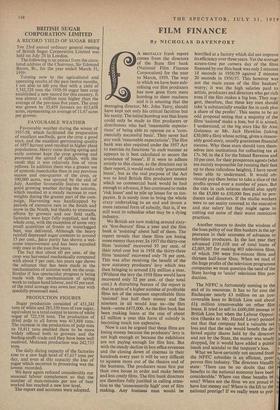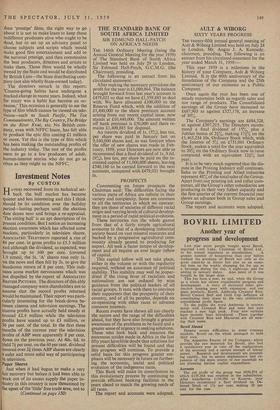FILM FINANCE
By NICHOLAS DAVENPORT
A BRUTALLY frank report comes from the directors of the State film bank (National Film Finance Corporation) for the year to March, 1959. The way in which we have been sub- sidising our film producers has now gone from mere humbug to sheer madness and it is amazing that the managing director, Mr. John Terry, should have kept not only his critical faculties but his sanity. The initial humbug was that loans could only be made to film producers or distributors who had 'reasonable expecta- tions' of being able to operate on a 'com- mercially successful basis'. They never had any such 'reasonable expectations'. The film bank was also required under the 1957 Act to exercise its functions 'in such manner as appears to it best calculated to secure the avoidance of losses'. If it were to adhere strictly to this clause, as the directors say in their report, it would make only 'guaranteed loans', but as the real purpose of the Act was to lend British film producers money which no commercial bank would be fool enough to advance, it has continued to make 'risk loans' and to pile up losses for us tax- payers. It is surely time to bring the whole crazy undertaking to an end and invent a more rational form of subsidy, that is, if we still want to subsidise what may be a dying industry.
We British are now making around sixty- six 'first-feature' films a year and the film bank is 'assisting' about half of them. The report reveals that these films are losing more money than ever. In 1957 the thirty-one films 'assisted' recovered 93 per cent. of their total cost but in 1958 the thirty-three films 'assisted' recovered only 76 per cent. This was after receiving the benefit of the now statutory producers' levy which was then bringing in around £3i million a year. (Without the levy the 1958 films would have recovered only 52 per cent. of their total cost.) A disturbing feature of the report is that in spite of a higher number of profitable films ten of the nineteen unprofitable films 'assisted' lost half their money and the nineteen in all would lose us—the film bank—some £475,000. As the film bank has been making loans at the rate of about £2 million a year this form of subsidy is becoming much too extensive.
Now it can be argued that these films are losing money because the producers' levy is not high enough or because the exhibitors are not paying enough for film hire. But with the steady decline in box office revenues and the closing down of cinemas in their hundreds every year it will be very difficult to squeeze more out of the theatre end of the business. The producers must first put their own house in order and make better and less costly films. The film bank directors are therefore fully justified in calling atten- tion to the 'unnecessarily high' cost of film making. Any business man would bo horrified at a factory which did not improve its efficiency over three years. Yet the average screen-time per camera day of the films financed by our film bank was only 2 minutes 18 seconds in 1958/59 against 2 minutes 20 seconds in 1956/57. This however was not the main cause of the film bankers' worry; it was the high salaries paid to artists, producers and directors who get rich even if the film makes a big loss. They sug- gest, therefore, that these key men should take 'a substantially smaller fee in cash plus a share of the profits'. This seems to be an odd proposal seeing that a majority of the films 'assisted' make a loss, but it is aimed, I understand, at the big stars like Sir Alec Guinness or Mr. Jack Hawkins (taking £30,000 a film) whose acting, given a reason- ably good story, usually guarantees financial success. Why these stars should turn them- selves into institutions for collecting tax at 17s. 9d. in the £ for the Inland Revenue and 10 per cent. for their prosperous agents (who are mainly responsible for running their fees up to these ridiculous heights), I have never been able to understand. It would ob- viously pay them better to take a slice of the profits spread over a number of years. But the cuts in cash salaries should also apply to the £5,000 to £10,000 fees paid to pro- ducers and directors. If the studio workers were to see sanity restored to the executive and star salary list they might agree to cutting out some of their worst restrictive practices.
Another reason to doubt the wisdom of the loan policy of our film bankers is the ap- pearance in their accounts of advances to television producers. In the last year they advanced £191,610 out of total loans of £2,005,387 for making 403 television films, of which 390 were five-minute films and thirteen half-hour films. When we read of the huge profits of the television programme companies we must question the need of the State having to 'assist' television film pro- duction.
The NFFC is fortunately coming to the end of its resources. It has so far cost the Exchequer nearly £3 million on an irre- coverable loan to British Lion and about El} million irrecoverable on other film loans. It tried to sell its £600,000 interest in British Lion but when the Labour Opposi- tion (thanks to Mr. Harold Lever) pointed out that that company had a valuable tax loss and that the sale would benefit the de- ferred equity shares held by the directors and not by the State, the matter was wisely dropped, for it would have added a public insult and scandal to the taxpayer's loss.
What we have certainly not secured from the NFFC subsidies is an efficient, pros- perous film industry. The directors blandly state: `There can be no doubt that the benefits to the national economy have been considerable.' Where can these benefits be seen? Where are the films we are proud to have lost money on? Where is the lift to the national prestige? If we really want to pro- duce 'prestige' films, the right way to go about it is not to make loans to keep those indifferent producers alive who ought to be dead, but to set up an advisory panel to choose subjects and scripts which would make good film entertainment and add to the national prestige, and then commission the best producers, directors and artists to make them. Those films would be wholly owned by the State and would be distributed by British Lion—the State distributing com- pany (not alas wholly State-owned today).
The directors remark in this report: 'Cinema-going habits have undergone a marked change in recent years. Indeed, what for many was a habit has becoMe an oc- casion.' This occasion is generally to see the type of film which cannot be viewed on tele- vision—such as South Pacific, The Ten Commandments, The Big Country, The Bridge on the River Kwai, etc. No British com- pany, even with NFFC loans, has felt able to produce the epic film costing £1 million or more. Yet this is the type of film which has been making the outstanding profits of the industry today. The rest of the profits seem to go to a few producers of adult, human-interest stories who do not go as often as they might to the NFFC.































 Previous page
Previous page